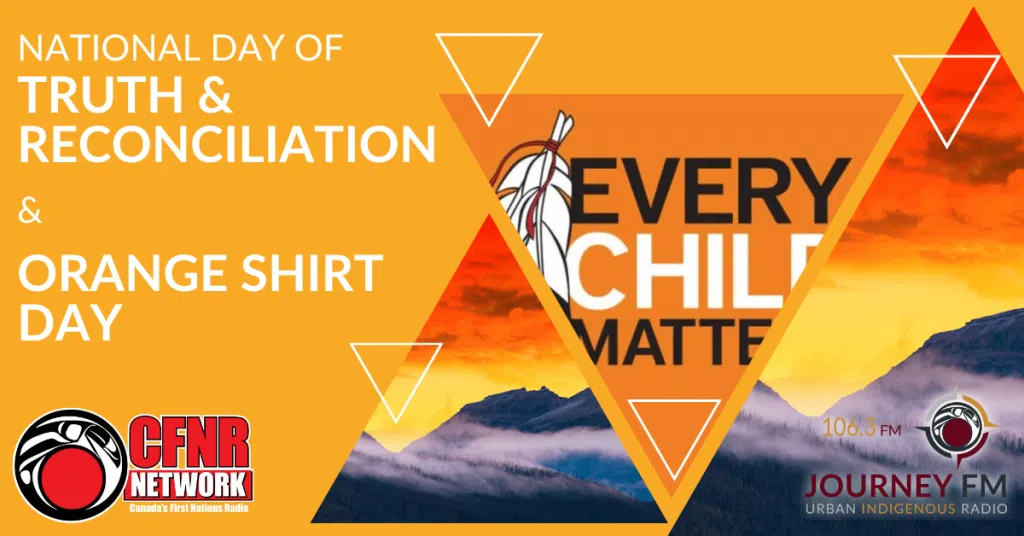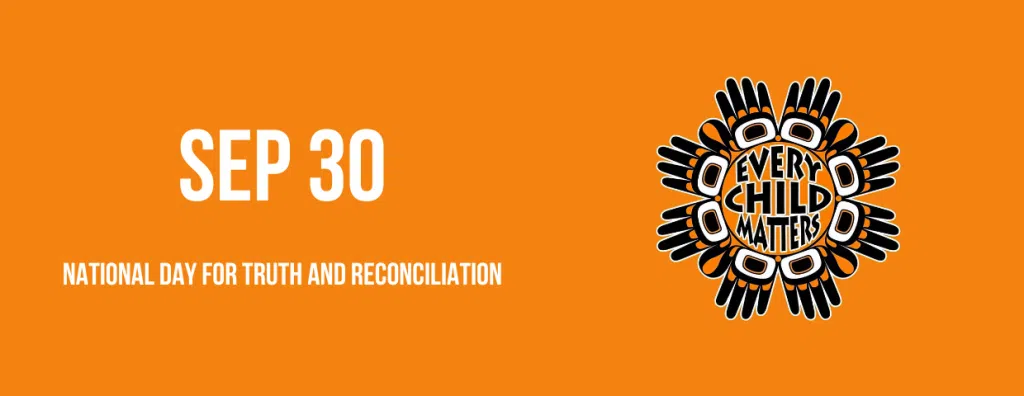Truth & Reconciliation


Here are some messages from CFNR staff about the day of Truth & Reconciliation
Hello, my name is Tania Vance from Canada’s First Nations Radio. Truth and Reconciliation Day is a meaningful day to me as my family has been directly affected by the generational trauma and residential schools, and colonization in this country. I am only two generations from residential schools because I am the granddaughter of a residential school survivor.
Truth and Reconciliation Day is a time to reflect. There is no reconciliation without acknowledging the truth of what happened to indigenous people and how this has affected indigenous people in the coming generations. By learning the true history and acknowledging the wrongs of the past, there can be a deeper understanding, which will create unity and positive change.
Meduh.
My name is Yulanda Leighton of the Haida Nation. I’m the General Sales Manager with Northern Native Broadcasting, and I’m a proud Haida-Tsimshian woman, mother, Nana, spouse, and auntie. September 30th, marks Truth and Reconciliation Day, also known as Worn Shirt Day. An occasion to honour the indigenous children and families who suffered through the painful experiences of the residential school system in Canada. It is also a time to actively engage in reconciliation practices and work together to create a better future for everyone. Acknowledging our history is an important starting point, but building and strengthening relationships with indigenous peoples based on recognition of rights, respect, and allyship.
Is what’s most important. I encourage you to practice truth and reconciliation not only on September 30th, but throughout the whole year. Support authentic indigenous artists, creators, jewellers, businesses. Shop there, work with them, and reach out and engage, share content and support will facilitate the change that is needed to learn the truth and work towards reconciliation.
My umpsiwah name is Chad Wells. I’m Tsimshian, from the Gitselasu First Nations. My cultural name is Gii gyax’gm nelx, which means Floating Killer. Truth and Reconciliation is an emotional day for me as my dad went to residential school, so our language wasn’t spoken very much at home, but my parents continued to make strong efforts and revitalizing our culture even today.
I am proud to say that my children attend the Na’ Aksa Gyilak’yoo School, which is a school in Kitsumkalum, where they are taught our culture and language every single day. They even learn how to speak our language and sing in Symalgyax, which is pretty amazing hearing my dad say to us. And my kids, you are living our dream.
Look at you. Go. Which means the entire world to me. People of my generation are proudly decolonizing, uh, the world that we live in today, bringing respect and prosperity to all. It brings me some reconciliation in the truth, being told to the world. Łoomks da taniis nuusm, respect to all.
My name is Craig Ellis, general manager of Northern Native Broadcasting, CFNR, and Terrace and CJNY in Vancouver, and I have the privilege of speaking to you today from the unceded and ancestral territory of the Kitselas people of the Tsimshian First Nation. September 30th in Canada is the National Day for Truth and Reconciliation, and I invite you on that day, especially to focus on two very important words in that statement, truth and reconciliation.
In order for us to understand the truth, we need to look back in our history and a little known document called the Royal Proclamation of 1763. This document was never taught to me when I was in school back in the sixties and seventies. I believe that by reading this document, it’ll give you a better understanding of First Nations rights, titles, and protections of their land.
And I think it’s disgraceful that this was ignored by those who taught history. As challenging as that part of our history is it’s nowhere near as difficult and challenging as the dark part of our history, known as the Indian Residential School System. Imagine that trying to eradicate a nation’s culture through forced indoctrination is wrong, period.
Nobody has the right to show up at your door and confiscate your children, move them a thousand miles away so their parents don’t have access to them, or vice versa. Nobody has the right to do that. Imagine the disconnect and disorientation these children must have felt when they returned home from school if they were lucky enough to do so.
They no longer fit into their societies. They no longer fit into their families culturally, and they also didn’t fit into the culture they were supposed to integrate into because of systemic racism. And the generational trauma that followed is still strongly felt by many generations to this very day. I think for reconciliation to happen, we must first recognize those mistakes of the past and then acknowledge them, and then following that understanding that we can’t change the past.
What we do have within our power to do is build a better future, a brighter future for everyone. A more just future for everyone. A future that’s healthier for all. I’m Craig Ellis from Northern Native Broadcasting, and I thank you for allowing me some time to share my thoughts on the National Day for Truth and Reconciliation.
What does truth and reconciliation mean to you? As someone who grew up removed from my culture, due to the impacts of colonization, discrimination, and the attempted genocide of an entire race, to me, truth and reconciliation means reclaiming the knowledge, traditions, and culture of my ancestors. It’s about making safe spaces for honest conversation and creating hope for future generations.
Yotz. Hemajalas kelasu nugwa. Kobie Smith kelasu nugwa, from the Xa’isla Nation.
In my language, I said: Hello, my hereditary chief name is Hemajalas, and my given name is Kobie Smith. I am from the Haisla Nation.
Truth and Reconciliation, to me, is a day to honour our Residential School Survivors and to remember the children who never had the chance to return home.
I am a second-generation Residential School Survivor. My late dad, Ron Smith, attended Residential School in Port Alberni, along with some of his sisters and brothers—my nana’s and baba’s.
I cannot imagine what it was like to be taken away from your home by strangers, ripped from your parents’ arms, without knowing why, without knowing where you were going. Not even having the chance to give your parents one last hug.
In that moment, the children were no longer allowed to be children. Their childhoods were stolen. Their language, culture, and identity were taken from them.
I cannot imagine the pain and grief those children endured. This should never have happened to Indigenous children.
I am forever grateful that my dad and my grandparents survived, and that they were able to return home. Without them, I would not be here today.
We, as Indigenous people, are still here.
On Truth and Reconciliation Day, I ask you to walk softly. You may not know what the person beside you is going through. Be kind to one another,
and love one another.
Thank you for taking the time to listen. Wa — thank you
Hi, I’m Rob, and I’ve had the honor of working with this incredible indigenous led organization for about a decade now with CFNR. And of course now with CJNY, I’ve been working alongside people who are colleagues and of course members of the communities, many of which now I consider friends as this day, this week, this month is upon us.
For me. Truth and Reconciliation Day is a moment to reflect, to learn. And to honor the truths of the indigenous people’s experiences in Canada, it’s time to recognize the painful history and the ongoing impacts of residential schools and colonial policies. As someone who is not indigenous, I know my role in this journey is to listen, truly listen to the voices that have been long ignored, or even worse silenced as a moment of learning and teaching.
Listening is not passive. It’s an active commitment to understanding, to growing and standing beside indigenous peoples in their fight for justice, recognition and healing. Over the years, I’ve learned that being an ally means more than just words. It means action, respect, and humility. It means supporting indigenous led efforts, advocating for meaningful change, and amplifying indigenous voices.
And these are all actions I strive to take. But it does start with listening with an open heart and mind, ready to learn, and also a willingness to unlearn. Today I encourage everyone to take a moment to listen. Listen to the stories of the survivors, to the wisdom of their elders and to the voices of indigenous youth, each story.
Is a thread in repairing and making the fabric of truth whole again, and each story is essential in our shared journey towards reconciliation. Let’s all commit today, every day to listen, learn, and act, because reconciliation is a journey. We must all walk together.

